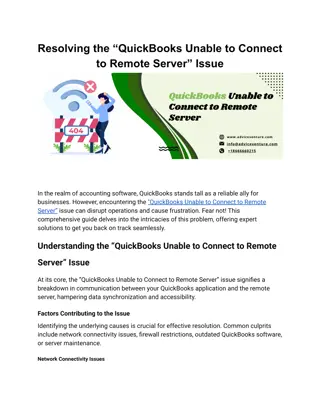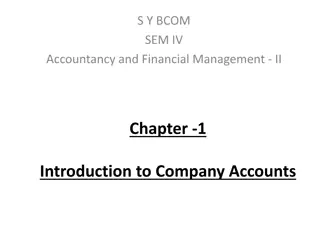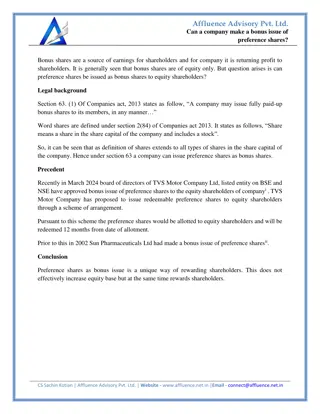
Understanding Companies: Formation, Features, and Types
Discover the meaning of a company, its features like legal personality and perpetual existence, as well as various types including Chartered, Statutory, and Registered companies. Explore the contractual capacity, management structure, and more essential aspects of companies.
Download Presentation

Please find below an Image/Link to download the presentation.
The content on the website is provided AS IS for your information and personal use only. It may not be sold, licensed, or shared on other websites without obtaining consent from the author. If you encounter any issues during the download, it is possible that the publisher has removed the file from their server.
You are allowed to download the files provided on this website for personal or commercial use, subject to the condition that they are used lawfully. All files are the property of their respective owners.
The content on the website is provided AS IS for your information and personal use only. It may not be sold, licensed, or shared on other websites without obtaining consent from the author.
E N D
Presentation Transcript
DR.RAJENDRA KUMAR SHUKLA DURGA COLLEGE RAIPUR
MEANING OF COMPANY Company is a voluntary association of persons formed for the purpose of doing business having a distinct name and limited liability. It is a juristic person having a separate legal entity distinct from the members who constitute it, capable of rights and duties of its own and endowed with the potential of perpetual succession. The Companies Act, 1956, states that 'company' includes company formed and registered under the Act or an existing company i.e. a company formed or registered under any of the previous company laws.
FEATURES OF A COMPANY 1. Registration: A company comes into existence only after registration under the Companies Act. But a Statutory Corporation is formed and commence business as notified or stated in the Act and as passed in Legislature. In case of partnership, registration is not compulsory. 2. Voluntary Association: A company is an association of many persons on a voluntary basis. Therefore a company is formed by the choice and consent of the members. 3. Legal Personality: A company is regarded by law as a single person. It has a legal personality. This rule applies even in the case of One-man Company.
4. Contractual Capacity: A shareholder of a company, in its individual capacity, cannot bind the company in any way. The shareholder of a company can enter into contract with the company and can be an employee of the company. 5. Management A company is managed by the Board of Directors, whole time Directors, Managing Directors or Manager. These persons are selected in the manner provided by the Act and the Articles of Association of the company. A shareholder, as such, cannot participate in the management. 6. Permanent Existence The company has perpetual succession. The death or insolvency of a shareholder does not affect its existence. A company comes into end only when it is liquidated according to provision of the Companies Act.
KINDS OF COMPANIES From the point of view of formation, the companies are of three kinds: (1) Chartered Companies Those companies which are incorporated under a special charter by the king or sovereign such as East Indian Company. Such companies are rarely formed now-a-days as trading companies. (2) Statutory Companies These companies are formed by special acts of Legislatures or Parliament. e.g.; the Reserve Bank of India, the Industrial Finance Corporation, Damodar Valley Corporation. (3) Registered Companies Such Companies which are incorporate under the Companies Act, 1956 or were registered under the previous Companies Act.
Form the point of view of liability there are three kinds of Companies (1) Limited Companies In case of such companies, the liability of each member is limited to the extent of a face value of shares held by him. Suppose A takes a share of Rs 10., he remains liable to the extent of that amount. As soon as that amount in paid, he is no more liable. (2) Guarantee Companies The liability of the member of such companies is limited to the amount he has undertaken to contribute to the assets of the company in the event of its wound up. This guaranteed amount is limited to fixed sum which is specified in the memorandum. (3) Unlimited Companies They are nothing but large partnership registered under the Companies Act and the members just like partners have unlimited liability and both share contribution as well as their property are at stake when the company is to be wound up. Such companies are rare these days.
From the point of view of Public investment companies may be of two kinds: (1) Private Companies : A private company means a company which by its articles (a) restricts the right to transfer its shares, if any (b) limits the number of its members to fifty excluding past or present employees of the company who are also members of the company. (c) Prohibits any invitation to the public to subscribe for any shares in our debentures of the company. (2) Public Companies : Public companies are those companies which are not private companies. All the three ABOVE restrictions are not imposed on such companies.





















